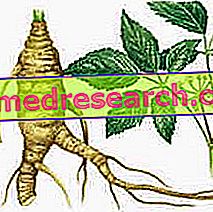
Scientific name
Eleutherococcus senticosus, sin. Acanthopanax senticosus
Family
Araliaceae
Origin
Siberia
Synonyms
Siberian Ginseng
Used Parts
The drug consists of the roots with bark and the rhizomes of the plant
Chemical constituents
- Caffeic acid derivatives;
- Hydroxycumarine (isofraxidine);
- Lignani, among which we find eleuteroside D;
- Flavonoids;
- Phytosterols;
- Eleutheroside B;
- Steroidal glycosides (eleuteroside A);
- Polysaccharides with an immunostimulatory action (eleuterans AG);
- Triterpene saponins (eleuterosidi I, K, L and M).
Eleutherococcus in Herbal Medicine: Properties of the Eleuterococcus
Eleutherococcus is traditionally considered the sportsman's plant, but in recent years most of the pharmacological and clinical studies have confirmed and highlighted an important immunostimulatory activity.
The current main indications for the use of this plant concern fatigue and convalescence from infectious and / or tumor diseases, also as an adjunct to other therapies.
Among the medicinal properties ascribed to eleuterococcus we mention the adaptogenic ones, stimulants of the central nervous system, antidepressants, general tonic and stimulating endocrine activity.
Biological activity
As mentioned, eleuterococcus is mainly attributed tonic-adaptogenic properties, very similar to those that are ascribed to ginseng. Not surprisingly, this plant is also known as Siberian ginseng .
Some clinical studies have shown that, in effect, eleuterococcus is able to counteract asthenia and the symptoms associated with it, such as weakness, fatigue and difficulty concentrating.
The aforementioned activities are mainly ascribed to the eleutherosides of various nature contained in the plant.
Moreover, from other studies it has emerged that eleuterococcus is also endowed with interesting immunostimulant and antiviral properties.
In vitro research has shown that eleuterococcus liquid extracts are able to inhibit the action of histamine, to promote the synthesis of cytokines and to stimulate the production of interleukin 1 and 2.
Clinical studies carried out on healthy volunteers have instead shown that the eleuterococcus liquid extract is able to increase the blood levels of lymphocytes, especially the T lymphocyte levels.
Eleutherococcus against asthenia and the symptoms associated with it
As mentioned, thanks to the properties conferred by eleuterosides contained in it, eleuterococcus has proved to be a valid and useful remedy for the treatment of asthenia and the symptoms associated with it, such as physical and mental fatigue, weakness and difficulty concentrating.
For the treatment of the aforementioned disorders, the eleuterococcus must be taken internally.
If the plant is used in the form of an extract, generally, we recommend taking about 0.3-0.5 grams of product three times a day.
However, for more detailed information, see the article on "Taking care of Eleuterococcus".
Eleutherococcus against the tendency to infections
Thanks to the immunomodulatory and immunostimulatory activity of the eleuterococcus, this plant is a particularly useful remedy for individuals with a tendency to develop infections, so much so that this type of use has been officially approved.
Also in this case, the plant must be used internally and we recommend taking about 0.3-0.5 grams of eleuterococco extract three times a day.
Eleutherococcus in folk medicine and in homeopathy
The tonic-adaptogenic properties of eleuterococcus are well known also to folk medicine, which uses the plant precisely to counteract tiredness, weakness, fatigue and difficulty concentrating; in addition to using it as a tonic remedy in the event of convalescence.
In Chinese medicine, however, eleuterococcus is used in the treatment of a wide variety of disorders and diseases, such as pain and weakness of the hip and knee, pain in the kidneys, urinary retention, impotence, rheumatoid arthritis and sleep disorders. Finally, traditional Chinese medicine also uses eleuterococcus as an immunostimulatory remedy.
Eleutherococcus is also used in homeopathic medicine, where it can be found in the form of granules, mother tinctures and oral drops. In this context, the plant is used in case of fatigue and surmenage and in case of intense training; in addition to being used in the event of convalescence.
The dose of homeopathic remedy to be taken can vary from one individual to another, also depending on the type of disorder that must be treated and according to the type of preparation and homeopathic dilution that you want to use.
Contraindications
Avoid using eleuterococcus-based preparations in case of insomnia, hypertension or hypersensitivity to one or more components.
Side effects
There are few reported side effects after taking Eleutherococcus (insomnia, irritability, palpitations and headache).
Pharmacological Interactions
- barbiturates: eleuterococcus increases the effect of drugs in animals;
- insulin: the dosage of the drug may need to change following the intake of eleuterococco;
- Aminoglycoside antibiotics: an increase in the efficacy of these drugs has been demonstrated during the treatment of intestinal Shigella and Proteus infections.



